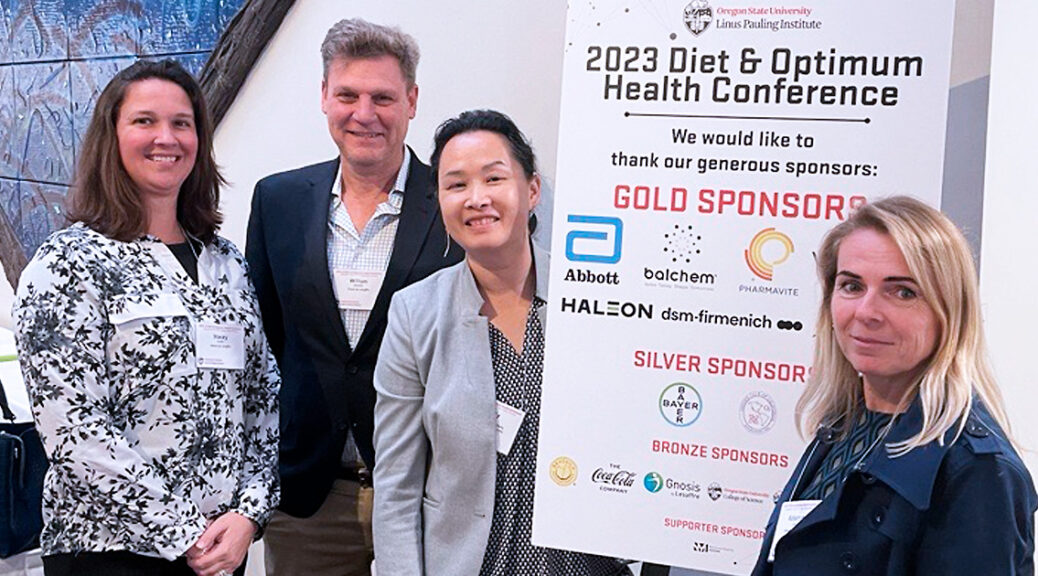
This year, the biennial Linus Pauling Institute Conference was set to ignite research at the dynamic intersection of health span and cutting-edge nutritional insights, within the realm coined Precision Health.
Having a key focus on nutrients that can support our foundational health, living longer and better lives, the pivotal role of Vitamin K2 as MK-7 was in its right element at this year’s conference.
Gnosis by Lesaffre, an event sponsor, contributed with its vitamin K2 experts, Dr. Stacey Smith and William Sommer, as the company co-presented its poster titled “Do we need more vitamin K than is recommended to maintain long-term health,” along with independent K2 researcher Dr. Katarzyna Maresz, which sparked great conversations on the conference floor. The poster addressed the critical need to look closer at the recommended daily dose of vitamin K – and highlighted research that suggests a higher RDI (Recommended Daily Intake) is needed to maintain long-term health.
The Triage Theory
The “triage theory” proposes that micronutrient deficiencies can accelerate aging and increase the risk of chronic diseases and predicts that optimizing micronutrient intakes will reduce the risk of chronic diseases and increase lifespan. Vitamin K is a fitting example of this hypothesis and is no longer recognized only as the coagulation vitamin. Traditionally, we have known vitamin K as the “coagulation vitamin,” essential for proper blood clotting. Beyond activating VKDP (Vitamin K Dependent Proteins) in the liver to preserve hemostasis, vitamin K – specifically K2 has a much broader scope, as it plays a significant role in activating non-hepatic VKDP, such as osteocalcin or matrix Gla protein.
The Impact of Vitamin K2 Deficiency
Lower-level activation of these VKDP has been linked to dietary vitamin K inadequacy and these deficiencies, in turn, have been associated with various health concerns, including bone fragility, arterial stiffness, and even cognitive decline. Furthermore, knowing Vitamin K insufficiency is found to increase with age this could impact two of the most critical areas of healthy aging: bone and cardiovascular health. Luckily, turning this around could not be easier, as supplementing with MenaQ7® Vitamin K2 is shown to improve bone strength and arterial elasticity.
Reassessing Dietary Recommendations
One striking revelation from the poster presentation is that current dietary recommendations in Western countries are primarily designed to prevent bleeding, with no consideration for Vitamin K2. This omission is due to the absence of an accurate food composition database for vitamin K2. In contrast, Japan incorporates the combined quantity of Vitamins K1 and K2 (MK4 and MK7) when determining daily recommended K intake.
Renowned Vitamin K2 Expert Dr. Katarzyna Maresz underscores the significance of the conference as the perfect platform to shed light on the necessity of reevaluating daily vitamin K recommendations for long-term health. She states, “The Linus Pauling Institute Conference is an ideal place to illuminate the need to re-consider the daily recommendations of vitamin K for long-term health, to an audience of key thought leaders in this field.”
The Poster presentation has undoubtedly illuminated the significance of vitamin K2 in maintaining long-term health. Beyond its role in blood clotting, vitamin K2’s impact on bone health, arterial function, cognitive well-being, and more cannot be ignored. As we navigate the ever-evolving landscape of nutritional science, rethinking dietary recommendations is an essential step toward promoting healthier, longer lives for all.
